How-To Guides
A how-to guide for Frigidaire dishwasher troubleshooting
AZparts Team
Updated on July 30, 2025
9 min read
The Frigidaire dishwasher saves time and effort but may face issues like not starting, weak cleaning, leaks, or poor drying that affect its performance. In this guide, AZParts offers detailed instructions on how to troubleshoot common issues with Frigidaire dishwashers, along with helpful maintenance tips to ensure long-lasting and stable operation.
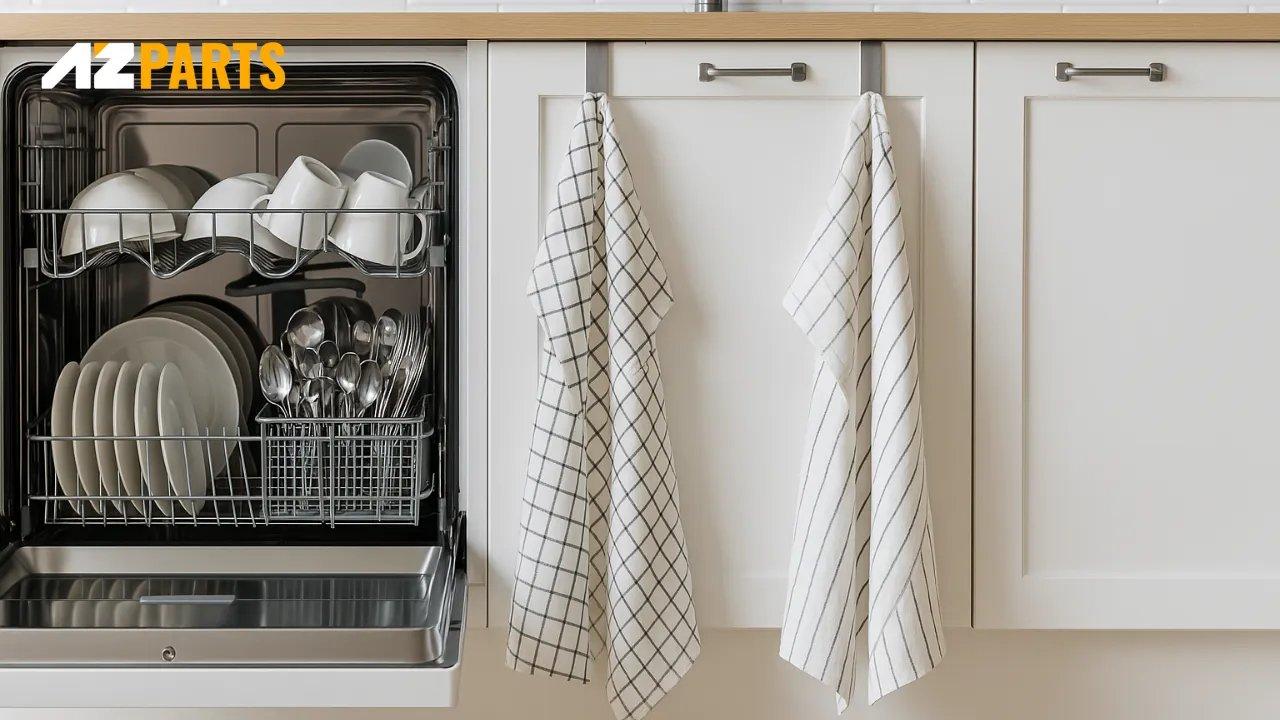
1. How Frigidaire dishwashers work
Frigidaire dishwashers operate through a closed-loop cycle that fully automates the dishwashing process by combining high-pressure water, heat, and detergent. This process not only removes stubborn food residues but also ensures effective sanitization and drying, helping users save both time and effort.
Specifically, the dishwasher performs the following steps:
- Water intake: At the beginning of the cycle, the machine pumps water from the supply source into the wash compartment in preparation for cleaning.
- Water heating: If programmed, the machine heats the water to the optimal temperature to improve grease breakdown and enhance the effectiveness of the detergent.
- High-pressure water spray: The spray arms rotate and release strong streams of water throughout the wash chamber, effectively dislodging food particles and debris from the dishes.
- Dirty water drainage: Once the washing stage is complete, the used water is pumped out through the drainage system to keep the compartment clean for the next phase.
- Dish drying: Depending on the model, the dishwasher may use various drying technologies such as PTC heating elements, heat exchangers, or Turbo Dry fans to quickly dry dishes while minimizing bacterial growth.
- Additional smart features: Some Frigidaire models are equipped with intelligent sensors that automatically adjust the wash time and water usage. They may also include a hot water rinse cycle to further improve cleaning performance and ensure better hygiene.
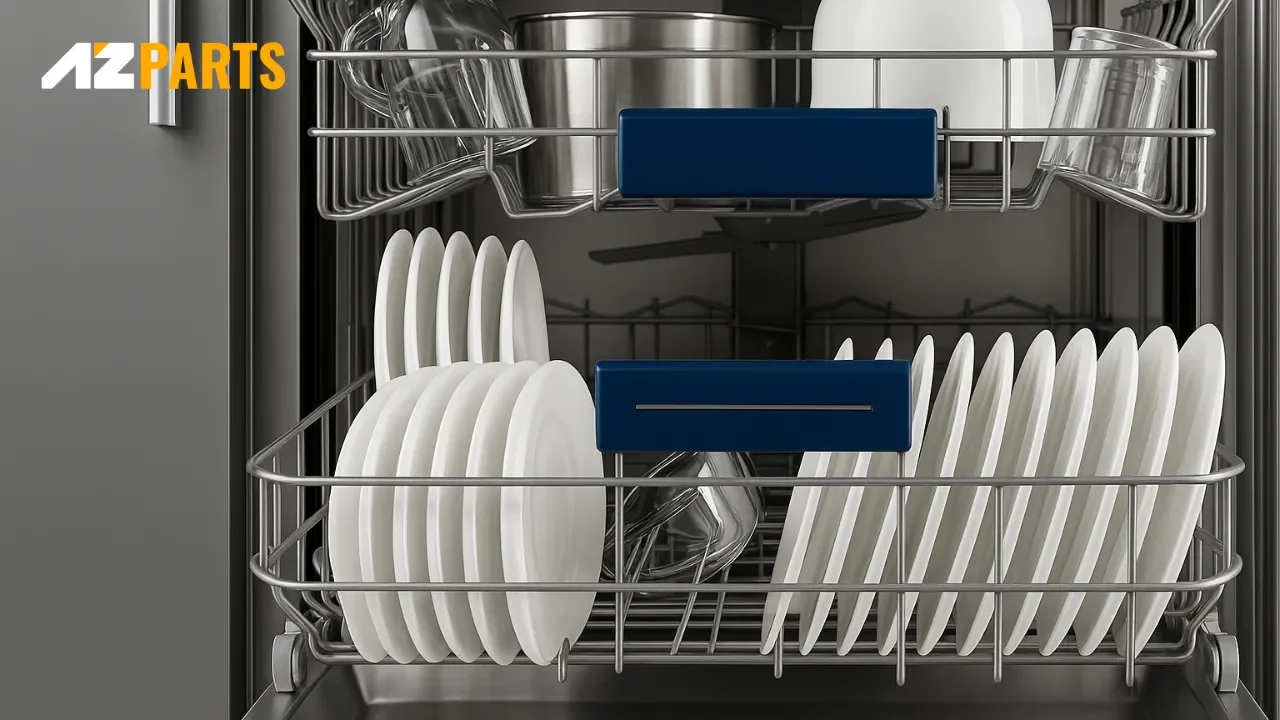
Frigidaire dishwashers automate cleaning using high-pressure water, heat, and detergent in a closed-loop cycle (Source: AZParts)
2. Troubleshooting your Frigidaire dishwasher
During use, Frigidaire dishwashers may encounter several issues that can affect cleaning performance or interrupt normal operation. Below is a summary of common problems along with suggested solutions.
2.1. Frigidaire dishwasher leaking
Water leaking from the dishwasher is often a sign that the door gasket is no longer functioning properly. The rubber gasket around the door is designed to seal the wash compartment and prevent water from escaping during the wash cycle. Over time, this component can wear out, crack, or become deformed, allowing water to seep out, potentially wetting the floor and posing risks such as electrical hazards or slips.
In such cases, the long-term solution is to replace the dishwasher door gasket with a compatible part. AZParts offers specialized replacement gaskets for Frigidaire dishwashers, made from durable, heat-resistant materials that help restore a proper seal and ensure smooth, leak-free operation.
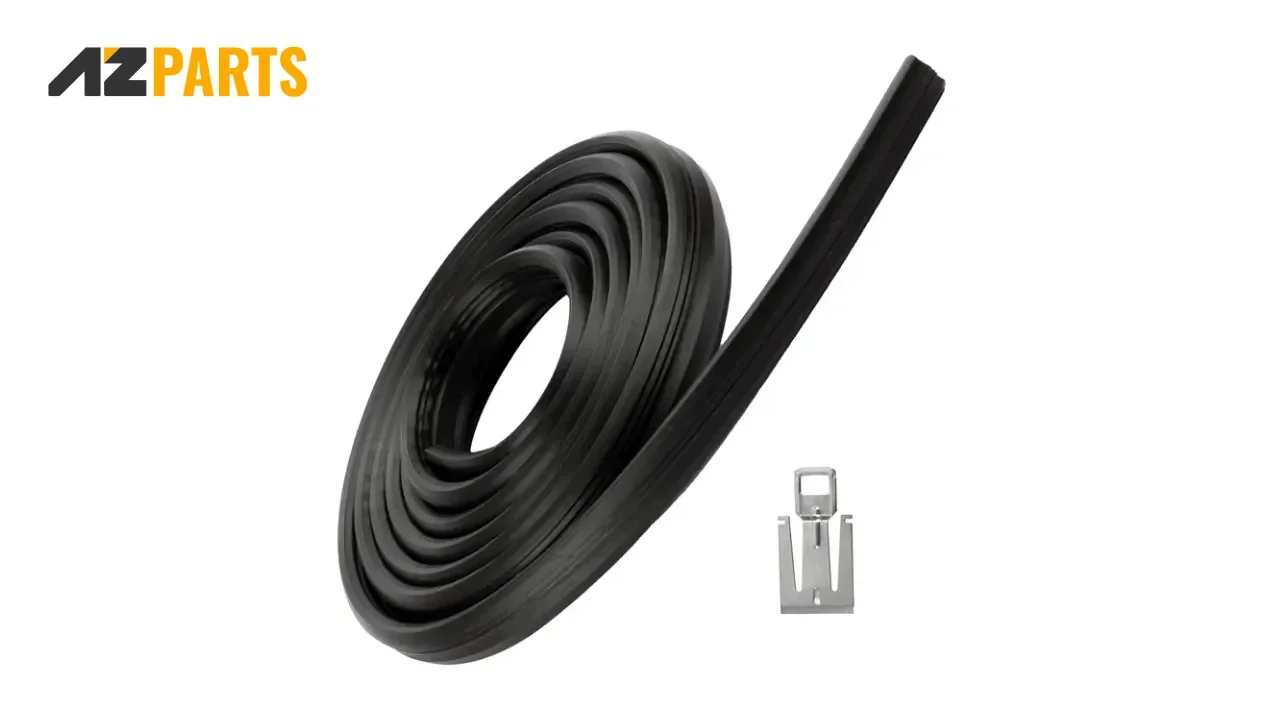
Door gasket prevents Frigidaire dishwasher leaking (Source: AZParts)
2.2. Frigidaire dishwasher won't start
If the dishwasher does not respond when you press the power button, you should begin by checking some basic factors such as the power supply, outlet, circuit breaker, and door switch. Frigidaire dishwashers are typically equipped with safety mechanisms that prevent the machine from starting if the door is not fully closed or the latch is not properly engaged. Additionally, a malfunctioning control panel or a damaged circuit board could also prevent the dishwasher from powering on.
To help identify the cause, try unplugging the dishwasher for a few minutes and then reconnecting it to see if the control panel resets or any indicator lights appear. If the machine still does not respond, it may be necessary to contact a qualified technician to inspect the electrical components and perform further diagnostics.
2.3. Frigidaire dishwasher not cleaning properly
If dishes come out with grease or food residue after a wash cycle, it’s often a sign that the spray arm system is not functioning correctly. Over time, food particles and mineral deposits can clog the spray arms, preventing water from being evenly distributed throughout the dishwasher. If the spray arms are unable to spin freely or release water at full pressure, the cleaning performance will noticeably decline.
If cleaning the dishwasher spray arms doesn’t resolve the issue, you may need to consider replacing them. AZParts offers replacement spray arms specifically designed for Frigidaire dishwashers, helping restore powerful and consistent water spray so your dishes are thoroughly cleaned after every cycle.
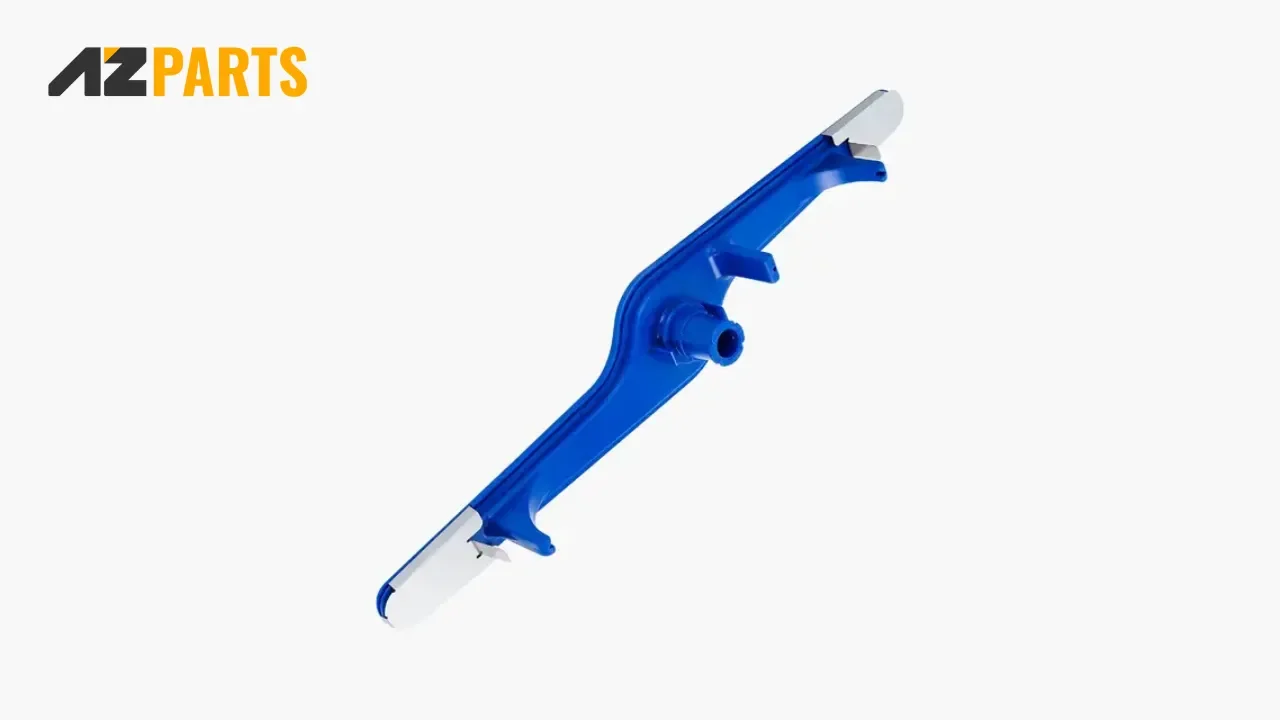
If cleaning the spray arms doesn’t resolve the issue, you may need to consider replacing them (Source: AZParts)
2.4. Frigidaire dishwasher not drying
If your dishes are still wet at the end of the wash cycle, the problem may be due to a malfunctioning heating element or because the drying option was not activated. Additionally, overcrowding the dishwasher or placing dishes too close together can block airflow, reducing drying efficiency. Some modern Frigidaire models use fans or heating elements for drying, which should be checked regularly to ensure they are working properly.
To improve drying performance, make sure the drying cycle is enabled, use rinse aid or detergent tablets with a built-in drying function, and keep the interior clean and free of moisture buildup.
2.5. Frigidaire dishwasher not draining
If you notice standing water at the bottom of the dishwasher after a cycle, the drainage system may be clogged or the drain pump might be faulty. Common causes include a kinked or blocked drain hose, debris buildup in the filter, or a jammed pump impeller due to foreign objects such as glass shards or food particles.
To fix this, check and clean the filter, inspect the drain hose for kinks or clogs, and ensure it is properly connected. If the issue persists after cleaning, the drain pump or water level sensor may need to be replaced.
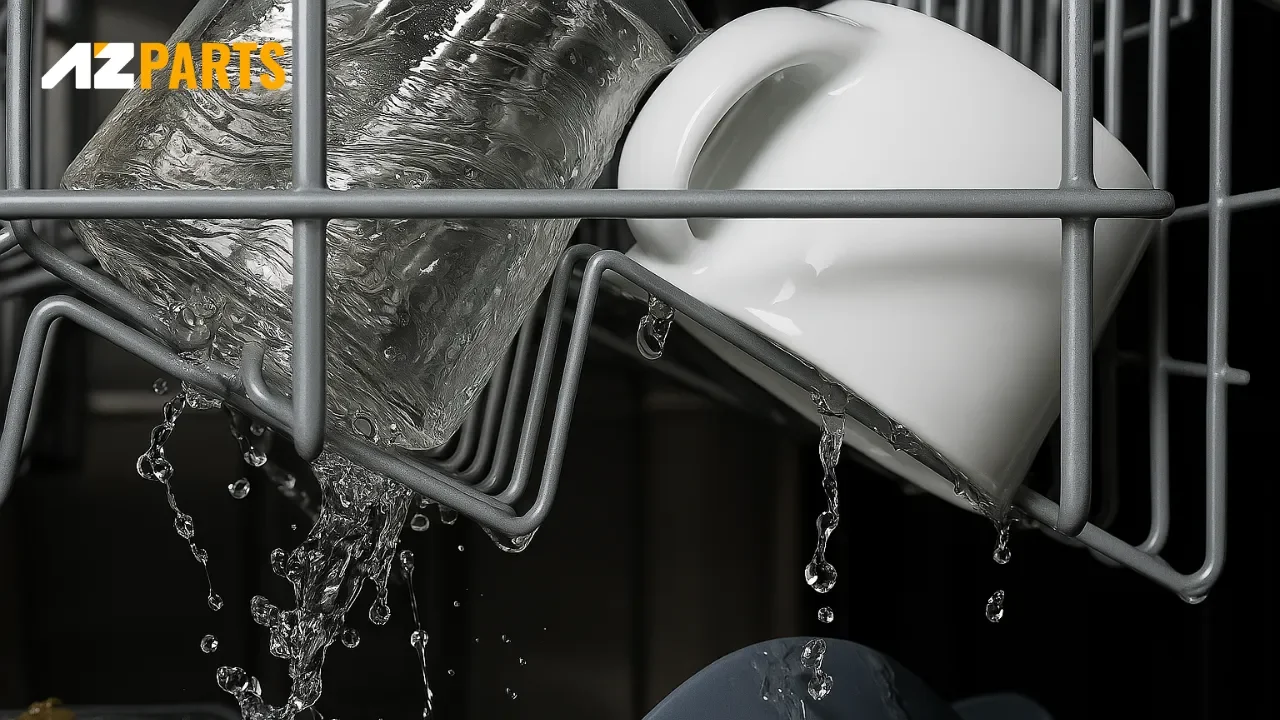
Frigidaire dishwasher not draining (Source: AZParts)
2.6. Frigidaire dishwasher touchpad not working
If the control panel is unresponsive or behaving erratically, it may be due to moisture buildup, a faulty circuit board, or loose wiring connections. Exposure to high humidity or physical impact on the panel can also affect touch sensitivity.
Try turning off the power and unplugging the unit for a few minutes before restarting. If the problem remains, you may need to open the control panel to inspect the circuit board or consider replacing the touchpad if necessary.
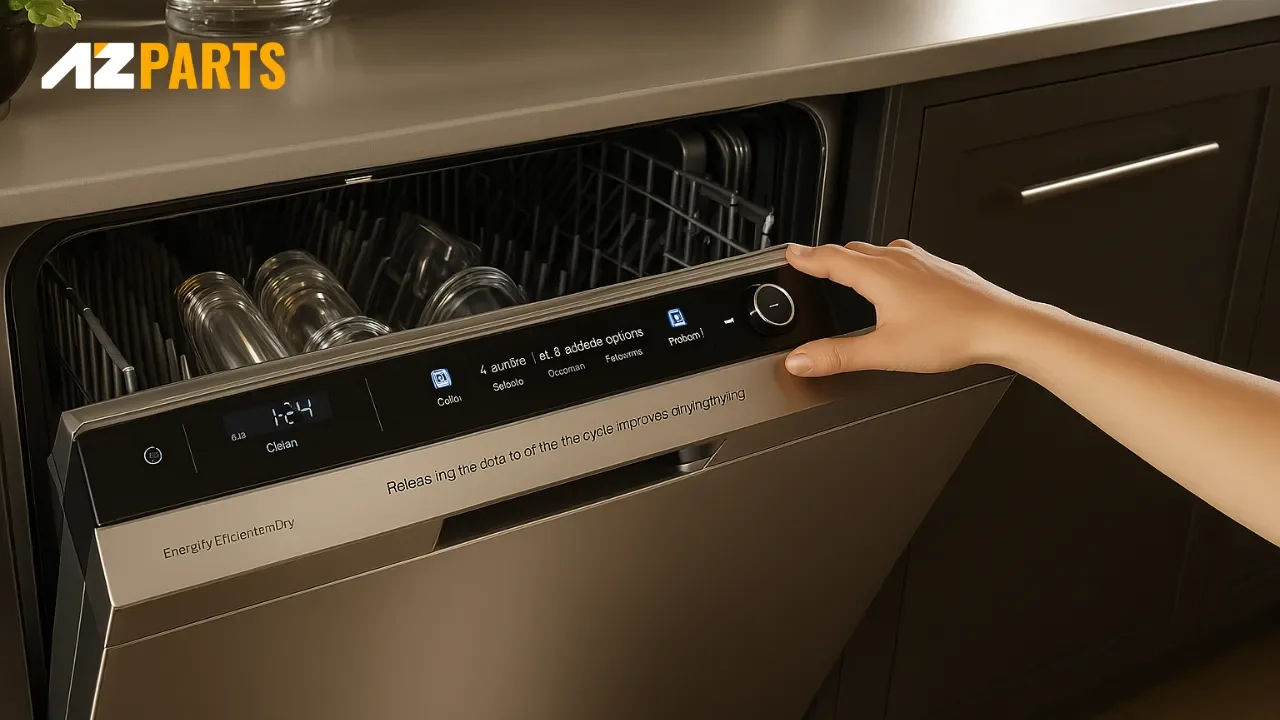
Frigidaire dishwasher touchpad not working (Source: AZParts)
2.7. Frigidaire dishwasher not filling with water
When the dishwasher fails to fill with water, check whether the water supply valve is fully open and whether the inlet filter is clogged with mineral deposits or debris. Low water pressure or a malfunctioning inlet valve could also prevent the dishwasher from filling properly.
Clean the inlet screen, check the valve for blockages, and ensure there are no leaks in the water line before considering a part replacement.
2.8. Frigidaire dishwasher door won't close
If the door does not close securely or appears misaligned, the issue may be with the hinges, door latch, or the door gasket. A worn latch or deformed gasket can prevent the door from sealing properly, which in turn stops the dishwasher from starting due to safety protocols.
Inspect all door components carefully, including the hinges, latch, and gasket. If the gasket is stiff or misshapen, it can be replaced with a new one from AZParts to restore a proper seal and ensure safe operation.
2.9. Frigidaire dishwasher smells
Bad odors inside the dishwasher are often caused by leftover food particles, grease, or stagnant water trapped in filters or hidden crevices. The humid and warm environment can promote the growth of bacteria and mold, leading to unpleasant smells and reduced cleaning hygiene.
To eliminate odors, clean the filter, spray arms, and drain hose at least once a week. You can also run an empty wash cycle using white vinegar or baking soda for a safe and natural deodorizing effect. After each use, leave the door slightly open to allow air circulation and prevent moisture buildup.
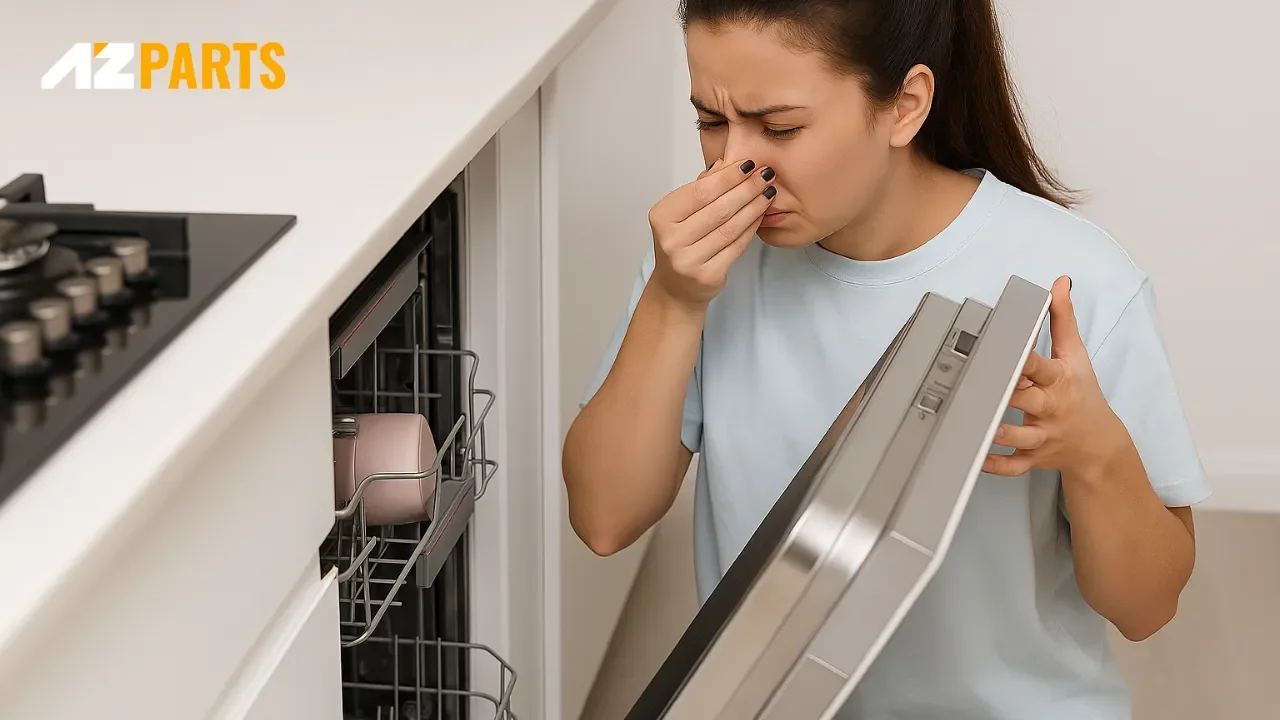
The humid and warm environment leading to unpleasant smells and reduced cleaning hygiene (Source: AZParts)
3. Tips to maintain your Frigidaire dishwasher with AZParts
To keep your Frigidaire dishwasher running efficiently and reliably over time, regular maintenance is essential. Below are simple yet highly effective tips you should follow to maintain optimal performance:
3.1. Clean the Filter and Spray Arms Regularly
After several uses, food debris and grease can accumulate in the bottom filter and spray arms. If not cleaned frequently, these parts can become clogged, reducing cleaning performance and causing unpleasant odors inside the dishwasher.
Remove the filter and spray arms, then rinse them under warm water using a soft brush to scrub away buildup. If the spray arms are cracked or damaged, consider replacing them to ensure strong, consistent water flow throughout the wash cycle.
3.2. Inspect and Maintain the Door Gasket, Latch, and Hinges
The rubber door gasket plays a critical role in preventing water leaks. Over time, it may harden, lose its shape, or become less elastic. This can compromise the seal, leading to leaks and unstable operation. Regularly inspect the gasket and wipe away any dirt or residue to maintain a tight seal.

Inspect and Maintain the Door Gasket, Latch, and Hinges (Source: AZParts)
3.3. Deodorize and Deep Clean the Interior Periodically
To prevent foul odors, run an empty wash cycle with white vinegar or dishwasher cleaning tablets every few weeks. This helps eliminate grease, food residue, and bacteria buildup. After each wash, leave the door slightly open to allow moisture to escape and prevent mold and mildew from forming inside.
3.4. Use Genuine Replacement Parts from AZParts
When it’s time to replace components such as spray arms, door gaskets, drain pumps, door switches, or control panels, always choose genuine parts from AZParts. These parts are built to exact specifications, ensuring proper fit, long-lasting durability, and seamless compatibility with Frigidaire dishwashers. This helps preserve the overall performance and extends the life of your appliance.
3.5. Avoid Overloading the Dishwasher
While it might seem convenient to fit as many items as possible into one cycle, overloading the dishwasher can restrict water flow and reduce cleaning efficiency. It also increases the risk of damaging internal parts like the spray arms or sliding rails.
For best results, load dishes with adequate space between them so water and detergent can circulate freely and reach every surface.
Using your Frigidaire dishwasher correctly and knowing how to handle common issues can help maintain its performance and extend its lifespan. From simple problems like failure to start or drain, to more complex ones such as water leaks or an unresponsive control panel, early detection and timely troubleshooting can prevent serious damage and save you from costly repairs.
Learn more about other dishwasher's issues and how to fix them:
Contact Info
Address: 8 The Green, Ste A, Dover, Delaware 19901-3618, United States
Email: support@azparts.com
Dishwasher
- 1. How Frigidaire dishwashers work
- 2. Troubleshooting your Frigidaire dishwasher
- 2.1. Frigidaire dishwasher leaking
- 2.2. Frigidaire dishwasher won't start
- 2.3. Frigidaire dishwasher not cleaning properly
- 2.4. Frigidaire dishwasher not drying
- 2.5. Frigidaire dishwasher not draining
- 2.6. Frigidaire dishwasher touchpad not working
- 2.7. Frigidaire dishwasher not filling with water
- 2.8. Frigidaire dishwasher door won't close
- 2.9. Frigidaire dishwasher smells
- 3. Tips to maintain your Frigidaire dishwasher with AZParts
Further Reading
Further Reading

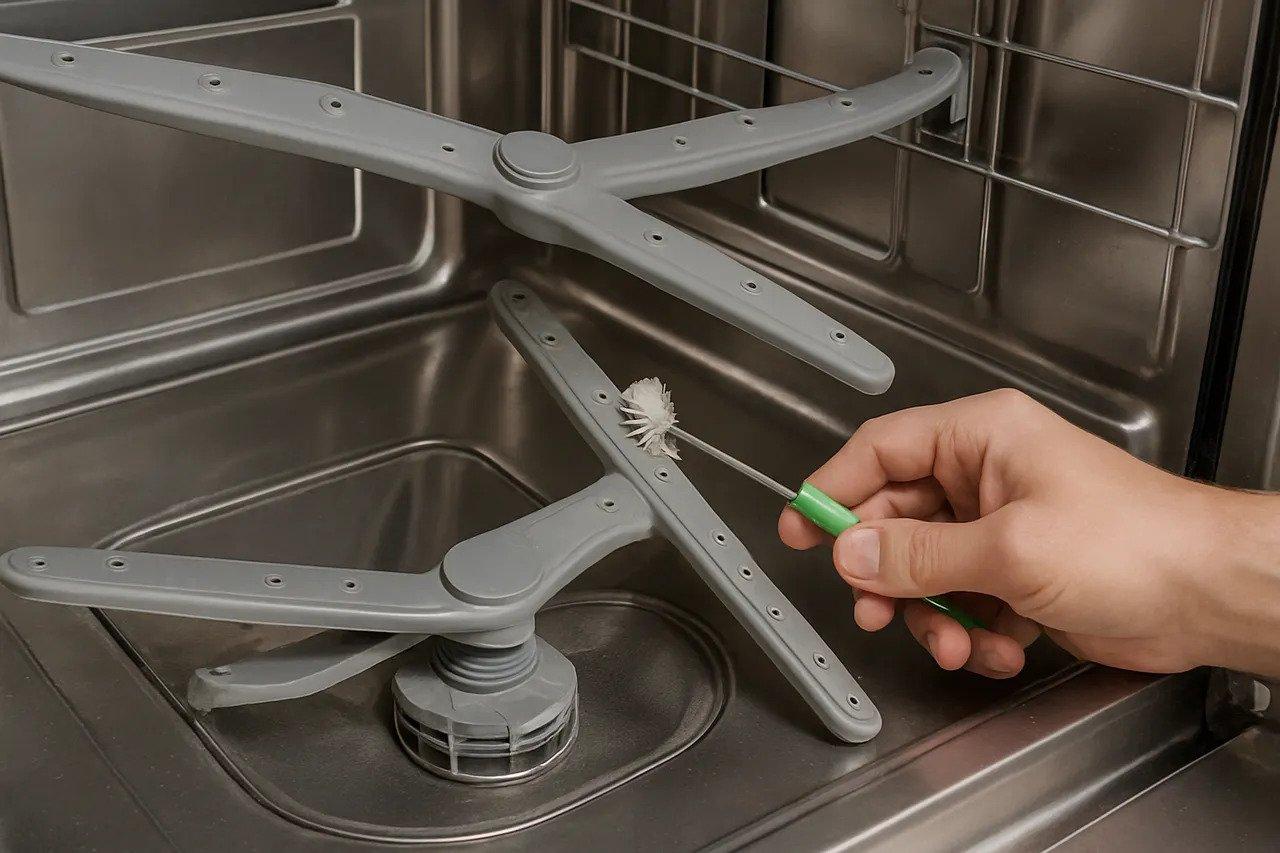
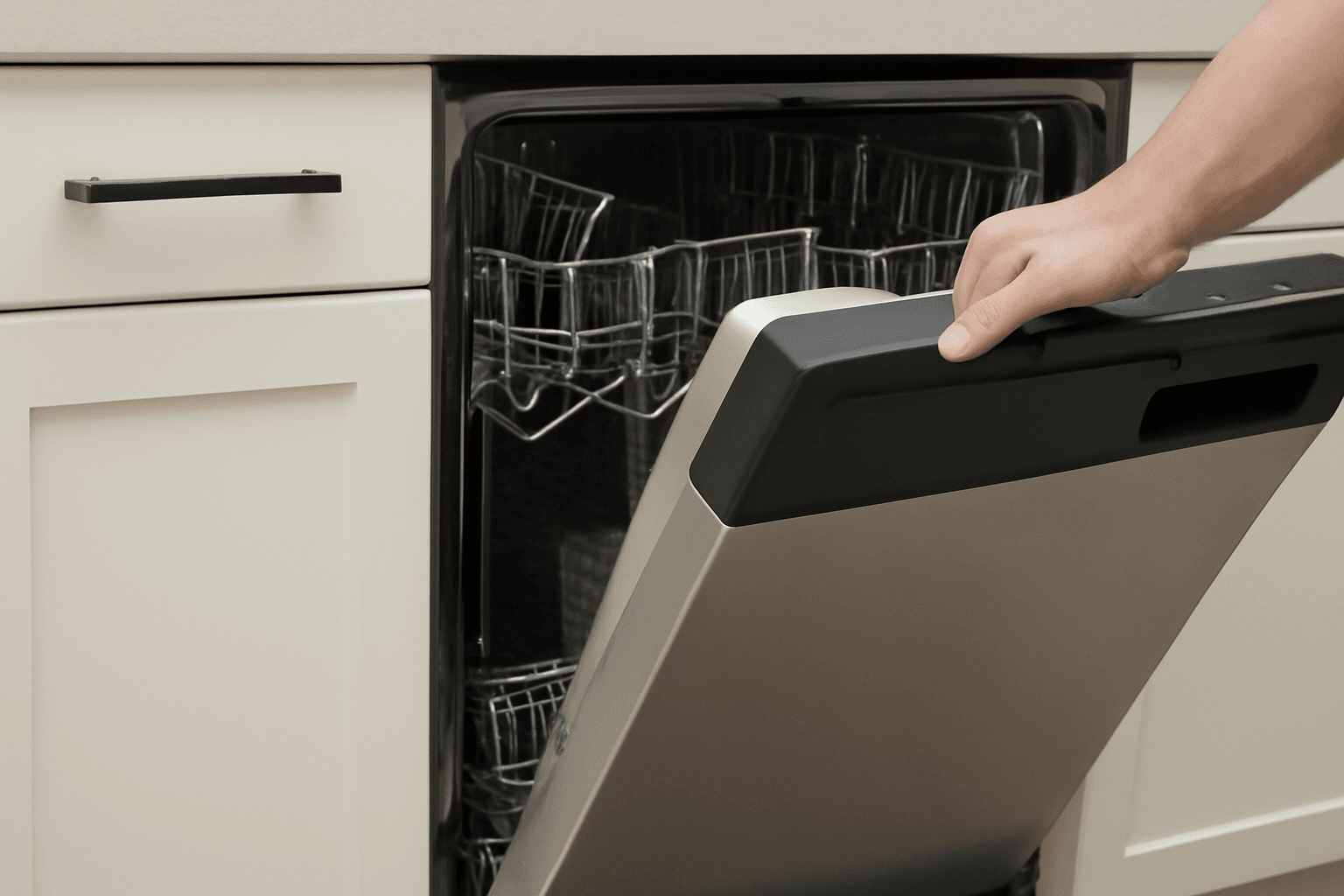

_1748246700.jpg&w=3840&q=75)
